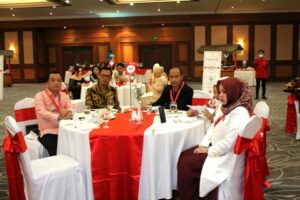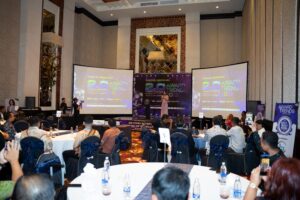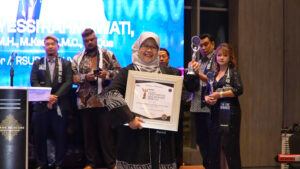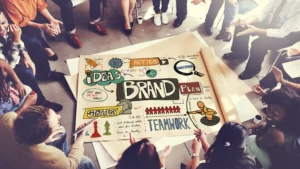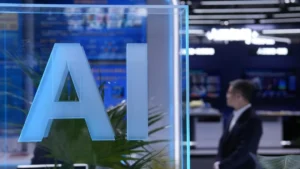“Price can be lowered. But trust — that takes years of consistency, character, and proof.”
— GP Herry SaputroThe world of business is entering a new era — one defined not by discounts, but by dependability.
As Indonesia approaches 2026, the marketplace is noisier, faster, and more unpredictable than ever before. Yet amid that chaos, one truth stands out: trust has become more valuable than price.Consumers have evolved. They no longer buy simply based on cost or convenience. They buy from brands — and people — they believe in.
“Cheap used to sell,” says GP Herry Saputro, founder of GP TALK and Award Magazine. “But now, it’s the trusted ones who win. Modern business is no longer about who sells the most, but who’s remembered for integrity.”The Trust Crisis in an Overpromoted World
2026 presents a striking paradox: marketing noise is everywhere, yet genuine trust is disappearing.
“People are being attacked by ads from every direction — phones, social feeds, marketplaces,” Herry explains. “But too many promises are made without being fulfilled.”He calls this the trust deficit — a crisis of credibility in the age of overpromotion.
“In today’s world, people don’t believe what you say — they believe what others say about you. Social proof is the new persuasion. And that comes only through recognition, consistency, and visibility.”From Marketing to Meaning: A Shift in Mindset
The rules have changed. Promotion alone no longer drives success. Without credibility, even the loudest campaigns fade into the background.
“In this age of over-information, the problem isn’t lack of exposure,” Herry says. “It’s lack of authenticity.”He believes 2026 will be remembered as the year when reputation replaced advertising as the foundation of growth.
Three pillars now define how trust is built and sustained: integrity, exposure, and recognition.
- Integrity: words that match actions.
- Exposure: credible media visibility that reinforces perception.
- Recognition: awards or certifications that validate excellence.
“Together,” he adds, “these form the architecture of trust — the invisible structure that holds every lasting business relationship.”
Media and Awards: The Infrastructure of Credibility
For Herry, media and awards are not luxuries; they’re the bridges that connect businesses to belief.
“When you receive an award, it’s not coincidence,” he says. “It’s the result of evaluation, research, and verification.”Recognition and credible press coverage serve as social proof — public evidence that reinforces a brand’s reliability.
“Trust is never built on slogans,” Herry emphasizes. “It’s built on proof that others already trust you.”He compares a strong reputation to a certificate of authenticity.
“Once you’ve earned it, price becomes secondary. People are willing to pay more because they feel safe — and safety is priceless.”Consumers Buy Confidence, Not Commodities
Modern consumers are not driven by discounts; they’re driven by assurance.
“They’ll gladly pay more if it reduces their risk of disappointment,” Herry says.
That’s why premium brands continue to thrive even when markets tighten.“Trust works like emotional insurance,” he explains. “People buy peace of mind — and that peace comes from names they respect.”
Personal Branding: The Human Face of Trust
Herry highlights that in 2026, personal branding is no longer optional — it’s essential.
“The public wants to know who’s behind the brand,” he says. “Who’s leading it. Who’s taking responsibility.”When leaders — founders, CEOs, entrepreneurs — step into the public eye, their visibility transfers credibility to the brand itself.
“People don’t connect with logos,” Herry notes. “They connect with people. Trust begins with a human story.”He believes building trust in the modern era means showing humanity: transparency, consistency, and courage to be seen.
Business Beyond Transactions: The Relationship Economy
The future of business, Herry insists, will be built on relationships, not transactions.
“Long-term loyalty doesn’t come from low prices,” he says. “It comes from experiences people believe in.”Awards, media features, and published works aren’t symbols of vanity — they’re tools of trust.
“They reinforce your credibility with clients, partners, and the public,” he adds.“Trust is the invisible capital that keeps a business alive, even when profit margins shrink.”
— GP Herry Saputro2026: The Year to Be Trusted, Not Just Noticed
Herry concludes with a reminder that feels both urgent and timeless.
“If you’re not building trust today, you’ll be invisible tomorrow. The market is full of products — but starving for credible figures.”To him, 2026 isn’t just another year in business. It’s a mirror — a test of whether your brand merely sells or truly earns belief.
He pauses and smiles before adding:“In business, prices can fall.
But trust — once earned — never loses its value.”
